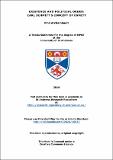Files in this item
Existence and political order : Carl Schmitt's concept of enmity
Item metadata
| dc.contributor.advisor | Slomp, Gabriella | |
| dc.contributor.advisor | Paipais, Vassilios | |
| dc.contributor.author | Archambault, Emil | |
| dc.coverage.spatial | 144 | en_US |
| dc.date.accessioned | 2017-01-04T11:02:47Z | |
| dc.date.available | 2017-01-04T11:02:47Z | |
| dc.date.issued | 2017-06-20 | |
| dc.identifier.uri | https://hdl.handle.net/10023/10037 | |
| dc.description.abstract | This thesis provides a comprehensive study of the development of the concept of enmity in the thought of Carl Schmitt. I argue that the concept of enmity provides the foundation upon which all of Schmitt's writings on international theory build. By attending to the concept of enmity, it is therefore possible to clarify Schmitt's understanding of international order, of war and peace, and of political existence. Additionally, I seek to demonstrate in this thesis the consistency of Schmitt's thought throughout his career, as well as the necessity of understanding his political theory through his historical context. The first part of this thesis examines the foundations of Schmitt's concept of the political, and argues that the link of the political to order follows naturally from the ontological assumption of a plural world and of a potentially violent human nature. Additionally, it argues that political enmity therefore must bear a relation to order, thereby excluding absolute enmity from the domain of the political. An examination of total war follows, arguing that Schmitt associates the political with defensive total war, against the danger of offensive total war. The latter part of this thesis turns to Schmitt's historical discussion of enmity. First, it is argued that the bracketing of war and enmity in the jus publicum Europaeum relied necessarily on the externalisation of European enmity into a distinct, free space, namely the Americas and Africa. Second, I demonstrate that changes in the form of enmity brought about by European, colonial, and global transformations caused the collapse of the jus publicum Europaeum. I conclude this thesis by arguing for an interest in conceptions of global peace respecting the dynamic character of the political rather than seeking to depoliticise global order. | en_US |
| dc.language.iso | en | en_US |
| dc.publisher | University of St Andrews | |
| dc.rights | Attribution-NonCommercial-NoDerivatives 4.0 International | * |
| dc.rights.uri | http://creativecommons.org/licenses/by-nc-nd/4.0/ | * |
| dc.subject | Carl Schmitt | en_US |
| dc.subject | Enmity | en_US |
| dc.subject | International order | en_US |
| dc.subject | Political existence | en_US |
| dc.subject | War | en_US |
| dc.subject | Borders | en_US |
| dc.subject | Partisan warfare | en_US |
| dc.subject.lcc | JC263.S34A8 | |
| dc.subject.lcsh | Schmitt, Carl, 1888-1985--Political and social views | en_US |
| dc.subject.lcsh | Hostility (Psychology) | en_US |
| dc.subject.lcsh | Total war | en_US |
| dc.subject.lcsh | Peace--Political aspects | en_US |
| dc.title | Existence and political order : Carl Schmitt's concept of enmity | en_US |
| dc.type | Thesis | en_US |
| dc.contributor.sponsor | Mackenzie King Memorial Foundation | en_US |
| dc.contributor.sponsor | Fonds québécois de la recherche sur la société et la culture | en_US |
| dc.type.qualificationlevel | Doctoral | en_US |
| dc.type.qualificationname | MPhil Master of Philosophy | en_US |
| dc.publisher.institution | The University of St Andrews | en_US |
The following licence files are associated with this item:
This item appears in the following Collection(s)
Except where otherwise noted within the work, this item's licence for re-use is described as Attribution-NonCommercial-NoDerivatives 4.0 International
Items in the St Andrews Research Repository are protected by copyright, with all rights reserved, unless otherwise indicated.


